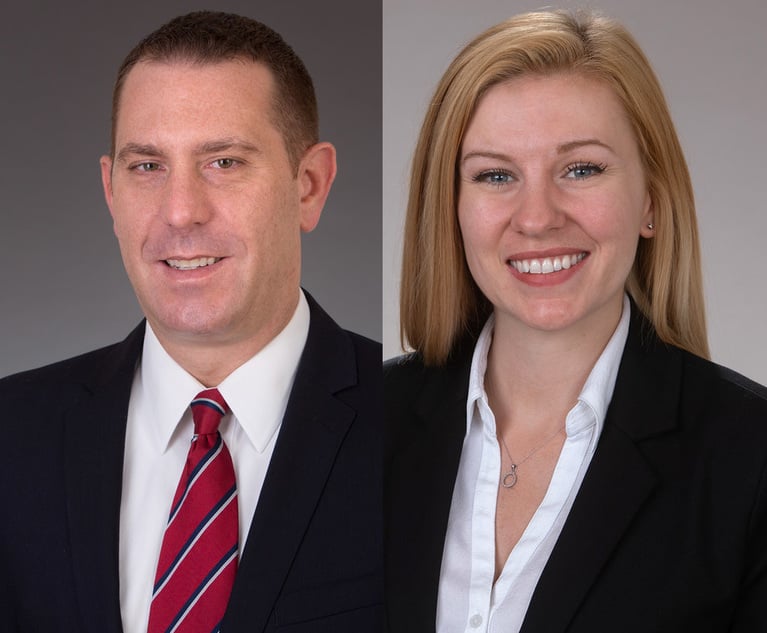Shifting Sands: Sanctions and the Failure to Preserve Data
Electronic discovery has changed how attorneys think about preservation of evidence. Gone are the days of filing cabinets where documents can be locked away, safe from loss. Lawsuits today are won and lost on electronically stored information (ESI), which can be deleted or overwritten by a party's computer system automatically and unintentionally.
October 17, 2017 at 11:37 AM
10 minute read

Electronic discovery has changed how attorneys think about preservation of evidence. Gone are the days of filing cabinets where documents can be locked away, safe from loss. Lawsuits today are won and lost on electronically stored information (ESI), which can be deleted or overwritten by a party's computer system automatically and unintentionally. As a result, the 2015 amendments to the Federal Rules of Civil Procedure changed how courts can remedy and punish the loss of ESI, setting the framework for an evolving standard that Florida may consider adopting.
Under the prior version of Federal Rule of Civil Procedure 37(e), sanctions could not be entered if ESI was lost as a result of the routine, good-faith operation of an electronic information system. The new version allows a court to impose sanctions if ESI “that should have been preserved in the anticipation or conduct of litigation is lost because a party failed to take reasonable steps to preserve it.” The rule was intended to address the burden and expense of over-preservation of data by prospective litigants worried about sanctions. Under the new FRCP 37(e), if the information that was lost cannot be restored or replaced through “additional discovery,” the court may order measures capable of curing any prejudice found to exist. However, the most severe sanctions cannot be entered absent a finding that a party intended to deprive an opponent of ESI.
The intent standard has been the subject of varying interpretations since the new rule went into effect in December 2015. Although some courts understood it as applying in all instances of data loss, a recent opinion drew a new line in the sand. In Hsueh v. New York State Department of Financial Services, Case No. 15-civ-3401-PAC (S.D.N.Y. March 31), the influential Southern District of New York—birthplace of modern e-discovery jurisprudence via the seminal case Zubulake v. UBS Warburg—held that FRCP 37(e) only applies when a party fails to take reasonable steps to preserve information, not when it purposefully deletes it. This was a significant decision because it clarified that two forms of intent exist: the intention not to preserve data (to which FRCP 37(e) applies) and the intent to actually destroy evidence (which can be remedied through the court's inherent powers). While Hsueh and cases like it showcase how federal civil procedure continues evolving well after the 2015 amendments, Florida is also prime for its own rule change.
The Florida equivalent to FRCP 37(e) is Florida Rule of Civil Procedure 1.380(e), which tracks the prior version of FRCP 37(e) and is currently under review in Florida Bar committees. In its current form, 1.380(e) provides that, “absent exceptional circumstances, a court may not impose sanctions … on a party for failing to provide electronically stored information lost as a result of the routine, good faith operation of an electronic information system.” In cases meeting the exceptionality standard—or in matters where ESI was lost for reasons other than routine operation—the imposition of sanctions will depend on satisfaction of a three-fold inquiry.
As set forth in Landry v. Charlotte Motor Cars, 2017 Fla. App. LEXIS 12794. *6, n. 5 (Fla. 2d DCA 2017), a Florida court must determine whether: “the evidence existed at one time; the spoliator had a duty to preserve the evidence; and the evidence was crucial to an opposing party's being able to prove its prima facie case or defense.” As the first prong is often the simplest to satisfy, the debate often centers on the second and third requirements. In League of Women Voters of Florida v. Detzner, 172 So. 2d 363, 391 (Fla. 2015), the Florida Supreme Court officially adopted a Zubulake-style preservation obligation that is based on whether a party had a reasonable anticipation of litigation, thus providing a test for the second prong of the sanctions analysis. Finally, a Florida court determines the significance of the subject evidence when deciding whether sanctions are appropriate, considering, among other things, whether the evidence is such that the party seeking a sanction cannot proceed with its case in the absence of the evidence lost. On the issue of what sanctions are available, and as discussed in Landry, a court considers “the willfulness or bad faith, if any, of the party who lost the evidence, the extent of the prejudice suffered by the other party, and what is required to cure the prejudice.”
In most cases qualifying for entry of a severe sanction, Florida courts prefer the application of an adverse evidentiary inference, reserving dismissal—the most severe sanction—to cases of willful destruction of evidence. Although it remains to be seen whether an amendment to Fla. R. Civ. P. 1.380(e) will mirror the text of the recently amended FRCP 37(e), there is no doubt that Florida lawyers will continue walking a tightrope, balancing themselves over the shifting sands of the rules.
Francesca Russo is a partner with the Miami intellectual property law firm of Espinosa Martinez, P.L. She may be reached at: [email protected]. Robert R. Jimenez is an associate with the firm and may be reached at: [email protected].

Electronic discovery has changed how attorneys think about preservation of evidence. Gone are the days of filing cabinets where documents can be locked away, safe from loss. Lawsuits today are won and lost on electronically stored information (ESI), which can be deleted or overwritten by a party's computer system automatically and unintentionally. As a result, the 2015 amendments to the Federal Rules of Civil Procedure changed how courts can remedy and punish the loss of ESI, setting the framework for an evolving standard that Florida may consider adopting.
Under the prior version of
The intent standard has been the subject of varying interpretations since the new rule went into effect in December 2015. Although some courts understood it as applying in all instances of data loss, a recent opinion drew a new line in the sand. In Hsueh v.
The Florida equivalent to FRCP 37(e) is Florida Rule of Civil Procedure 1.380(e), which tracks the prior version of FRCP 37(e) and is currently under review in Florida Bar committees. In its current form, 1.380(e) provides that, “absent exceptional circumstances, a court may not impose sanctions … on a party for failing to provide electronically stored information lost as a result of the routine, good faith operation of an electronic information system.” In cases meeting the exceptionality standard—or in matters where ESI was lost for reasons other than routine operation—the imposition of sanctions will depend on satisfaction of a three-fold inquiry.
As set forth in Landry v. Charlotte Motor Cars, 2017 Fla. App. LEXIS 12794. *6, n. 5 (Fla. 2d DCA 2017), a Florida court must determine whether: “the evidence existed at one time; the spoliator had a duty to preserve the evidence; and the evidence was crucial to an opposing party's being able to prove its prima facie case or defense.” As the first prong is often the simplest to satisfy, the debate often centers on the second and third requirements.
In most cases qualifying for entry of a severe sanction, Florida courts prefer the application of an adverse evidentiary inference, reserving dismissal—the most severe sanction—to cases of willful destruction of evidence. Although it remains to be seen whether an amendment to Fla. R. Civ. P. 1.380(e) will mirror the text of the recently amended FRCP 37(e), there is no doubt that Florida lawyers will continue walking a tightrope, balancing themselves over the shifting sands of the rules.
Francesca Russo is a partner with the Miami intellectual property law firm of Espinosa Martinez, P.L. She may be reached at: [email protected]. Robert R. Jimenez is an associate with the firm and may be reached at: [email protected].
This content has been archived. It is available through our partners, LexisNexis® and Bloomberg Law.
To view this content, please continue to their sites.
Not a Lexis Subscriber?
Subscribe Now
Not a Bloomberg Law Subscriber?
Subscribe Now
NOT FOR REPRINT
© 2025 ALM Global, LLC, All Rights Reserved. Request academic re-use from www.copyright.com. All other uses, submit a request to [email protected]. For more information visit Asset & Logo Licensing.
You Might Like
View All



Don’t Forget the Owner’s Manual: A Guide to Proving Liability Through Manufacturers’ Warnings and Instructions
5 minute readTrending Stories
Who Got The Work
J. Brugh Lower of Gibbons has entered an appearance for industrial equipment supplier Devco Corporation in a pending trademark infringement lawsuit. The suit, accusing the defendant of selling knock-off Graco products, was filed Dec. 18 in New Jersey District Court by Rivkin Radler on behalf of Graco Inc. and Graco Minnesota. The case, assigned to U.S. District Judge Zahid N. Quraishi, is 3:24-cv-11294, Graco Inc. et al v. Devco Corporation.
Who Got The Work
Rebecca Maller-Stein and Kent A. Yalowitz of Arnold & Porter Kaye Scholer have entered their appearances for Hanaco Venture Capital and its executives, Lior Prosor and David Frankel, in a pending securities lawsuit. The action, filed on Dec. 24 in New York Southern District Court by Zell, Aron & Co. on behalf of Goldeneye Advisors, accuses the defendants of negligently and fraudulently managing the plaintiff's $1 million investment. The case, assigned to U.S. District Judge Vernon S. Broderick, is 1:24-cv-09918, Goldeneye Advisors, LLC v. Hanaco Venture Capital, Ltd. et al.
Who Got The Work
Attorneys from A&O Shearman has stepped in as defense counsel for Toronto-Dominion Bank and other defendants in a pending securities class action. The suit, filed Dec. 11 in New York Southern District Court by Bleichmar Fonti & Auld, accuses the defendants of concealing the bank's 'pervasive' deficiencies in regards to its compliance with the Bank Secrecy Act and the quality of its anti-money laundering controls. The case, assigned to U.S. District Judge Arun Subramanian, is 1:24-cv-09445, Gonzalez v. The Toronto-Dominion Bank et al.
Who Got The Work
Crown Castle International, a Pennsylvania company providing shared communications infrastructure, has turned to Luke D. Wolf of Gordon Rees Scully Mansukhani to fend off a pending breach-of-contract lawsuit. The court action, filed Nov. 25 in Michigan Eastern District Court by Hooper Hathaway PC on behalf of The Town Residences LLC, accuses Crown Castle of failing to transfer approximately $30,000 in utility payments from T-Mobile in breach of a roof-top lease and assignment agreement. The case, assigned to U.S. District Judge Susan K. Declercq, is 2:24-cv-13131, The Town Residences LLC v. T-Mobile US, Inc. et al.
Who Got The Work
Wilfred P. Coronato and Daniel M. Schwartz of McCarter & English have stepped in as defense counsel to Electrolux Home Products Inc. in a pending product liability lawsuit. The court action, filed Nov. 26 in New York Eastern District Court by Poulos Lopiccolo PC and Nagel Rice LLP on behalf of David Stern, alleges that the defendant's refrigerators’ drawers and shelving repeatedly break and fall apart within months after purchase. The case, assigned to U.S. District Judge Joan M. Azrack, is 2:24-cv-08204, Stern v. Electrolux Home Products, Inc.
Featured Firms
Law Offices of Gary Martin Hays & Associates, P.C.
(470) 294-1674
Law Offices of Mark E. Salomone
(857) 444-6468
Smith & Hassler
(713) 739-1250






